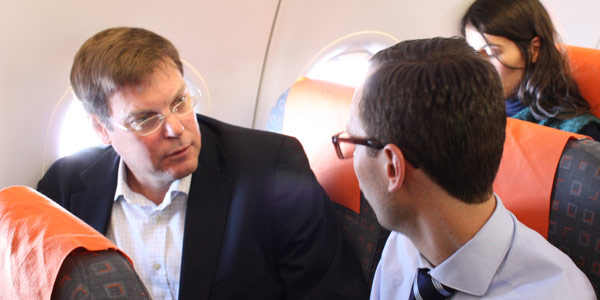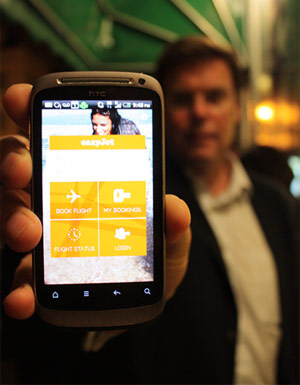
You would be forgiven for thinking that low-cost carriers think about nothing but cutting costs and making money, but easyJet (while admittedly sticking to these principles) is also working hard to improve the passenger experience on the ground.
Future Travel Experience correspondent Andreas Akerman, who is also the Deputy Editor of our sister publication anna.aero, last week attended easyJet’s new base launch in Lisbon, where he spoke to the airline’s COO Warwick Brady about ‘Project Halo’, how the airline is working to improve the passenger experience on the ground, and how it is making use of mobile technology and apps.

FTE: What are easyJet’s plans regarding ‘Project Halo’? What exactly will it involve?
Brady: We are developing a technology that will increase efficiency and lower costs by reducing infrastructure. ‘Halo’ devices are handheld ruggedised PDAs that have inbuilt barcode scanners. Staff on the ground will not be tied to a desk – they will be able to stand next to the passenger with the Halo device in their hand, scan the boarding pass, validate the passenger and board them. At the gate, the Halo devices will be able to scan mobile boarding passes. The Halo software is part of the departure software programme, meaning that it enables passengers to upgrade and add bags even at a stage as late as at the gate. We will start with trials in Geneva, Basel, Amsterdam, Barcelona and Edinburgh.
FTE: What other plans does easyJet have in place to improve the passenger experience on the ground?
Brady: We are looking at a number of things. The service in the cabin is consistent, the work to be done is on the ground. We look at everything from the kerb to the bag drop, security queues, the boarding process and so on. Although we outsource the ground handling, our handling agent contracts are constructed so that they suffer when easyJet suffers. This triggers efficiency improvements.
FTE: What are your views on the increasing use of self-service in the overall travel experience? Is self-service necessary to improve the passenger experience?
Brady: Using kiosks is just putting another step between the passenger and the bag drop. The only difference is that it can give the passenger the tag to self-tag. Mobile devices and the app is where the future lies. It enables us to communicate customer information, for example during flight disruptions. These things hadn’t changed for the last 50 years. It is a smart way to interface with the airline. Our problem is ‘How do we get information to passengers in real-time?’. With the mobile app, we can get it to them quicker, which improves the customer experience.
If you are interested in hearing a presentation on ‘Why airports need to embrace easyJet’s ‘Project Halo’ initiative, focusing on mobile passenger processing’ by Cath Lynn, Group Director Customer and Revenue, easyJet, attend the 22nd ACI EUROPE Annual Assembly hosted by Aena in Madrid, June 20-22.
>> More details can be found here.
Of course, if you are interested in the latest global innovations to improve the passenger experience on the ground, attend Future Travel Experience 2012, the only event in the world dedicated to this subject. FTE 2012 will be hosted by Vancouver Airport Authority, September 5-7.







